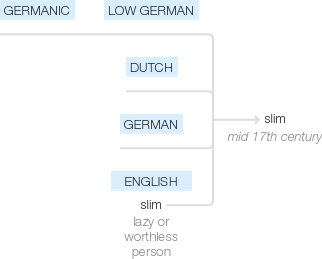Slim
mid 17th century: from Low German or Dutch (from a base meaning ‘slanting, cross, bad’), of Germanic origin. The pejorative sense found in Dutch and German existed originally in the English noun slim ‘lazy or worthless person’; compare with the South African usage ‘crafty, sly’ (slim (sense 3 of the adjective)).
wiktionary
(This etymology is missing or incomplete. Please add to it, or discuss it at the Etymology scriptorium. Particularly: “Details on sense development -- how did we get from "bad" to "favorably thin"?”) Borrowing from Dutch slim(“bad, sly, clever”), from Middle Dutch slim(“bad, crooked”), from Old Dutch *slimb, from Proto-Germanic *slimbaz(“oblique, crooked”). Compare Dutch slim(“smart, clever, crafty”)Middle High German slimp(“slanting, awry”), German schlimm(“bad”), West Frisian slim(“bad, dire”).
etymonline
slim (adj.)
1650s, "thin, slight, slender," from Dutch slim "bad, sly, clever," from Middle Dutch slim "bad, crooked," from Proto-Germanic *slembaz "oblique, crooked" (source also of Middle High German slimp "slanting, awry," German schlimm "bad, cunning, unwell"). In English 17c. also sometimes with a sense "sly, cunning, crafty." Related: Slimly; slimness. With obsolete extended adjectival forms Slimsy "flimsy, unsubstantial" (1845); slimikin "small and slender" (1745). Slim Jim attested from 1887 in sense of "very thin person;" from 1902 as a type of slender cigar; from 1975 as a brand of meat snack.
slim (v.)
1808, "to scamp one's work, do carelessly or superficially," from slim (adj.). Meaning "to make slim" (a garment, etc.) is from 1862; meaning "reduce (one's) weight" is from 1930. Related: Slimmed; slimming.
